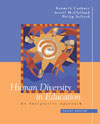

 Human Diversity in Education: An Integrative Approach, 4/e Creating Developmentally Appropriate Classrooms: The Importance of Age and Developmental Status True or False |
 2003 McGraw-Hill Higher Education
2003 McGraw-Hill Higher EducationAny use is subject to the Terms of Use and Privacy Policy.
McGraw-Hill Higher Education is one of the many fine businesses of The McGraw-Hill Companies.